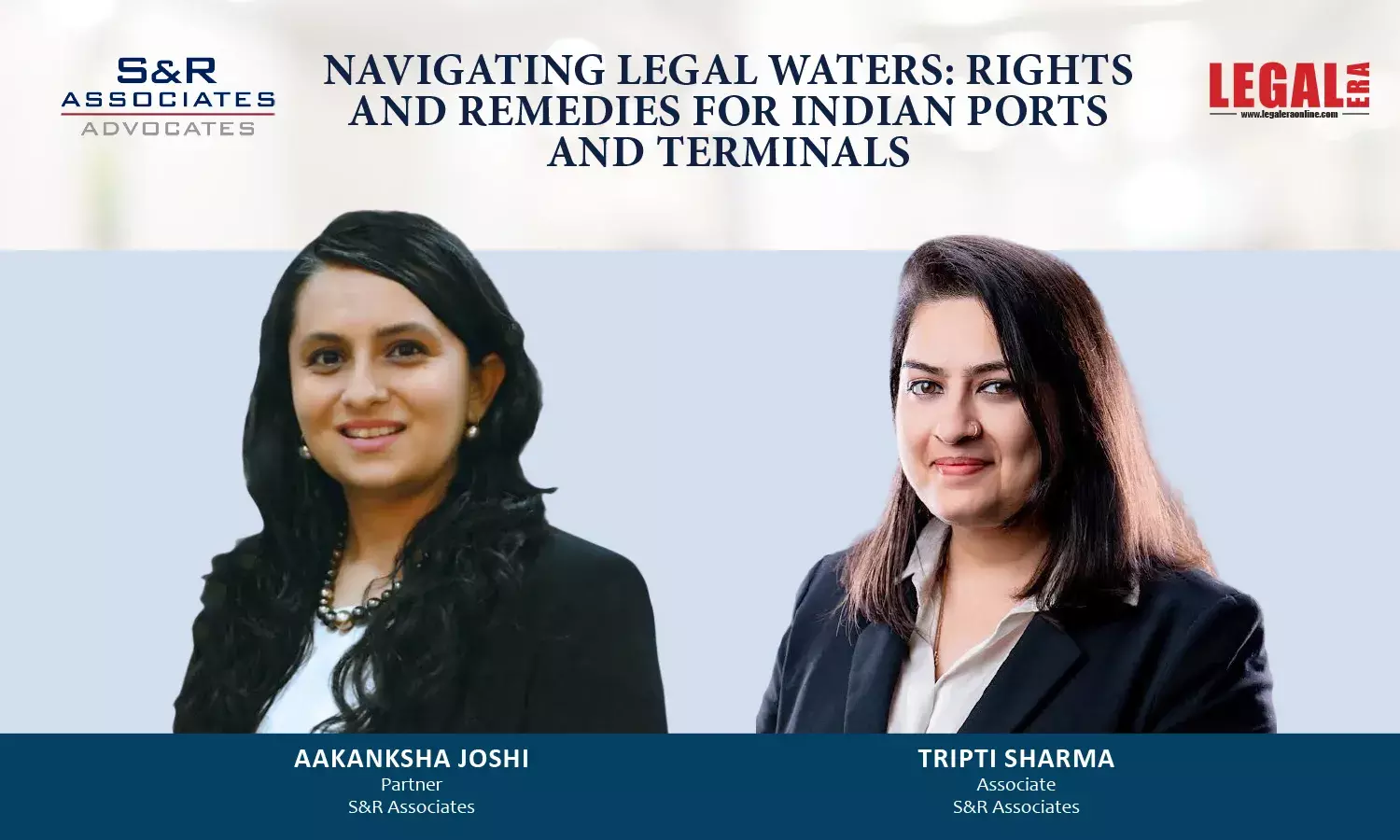Navigating Legal Waters: Rights And Remedies For Indian Ports And Terminals

Navigating Legal Waters: Rights And Remedies For Indian Ports And Terminals On February 23, 2024, the Orissa High Court allowed the arrest of a vessel, M.V. Debi (IMO 9616735, “Vessel”) in an admiralty suit1 filed by Paradip International Cargo Terminal Pvt. Ltd. (“PICTPL”) for enforcement of its maritime lien arising from unpaid berth hire charges and penal berth hire charges....
Navigating Legal Waters: Rights And Remedies For Indian Ports And Terminals
On February 23, 2024, the Orissa High Court allowed the arrest of a vessel, M.V. Debi (IMO 9616735, “Vessel”) in an admiralty suit1 filed by Paradip International Cargo Terminal Pvt. Ltd. (“PICTPL”) for enforcement of its maritime lien arising from unpaid berth hire charges and penal berth hire charges. Pursuant to a concession agreement between PICTPL and Paradip Port Trust, executed on a Public Private Partnership (“PPP”) basis, PICTPL has been granted a concession for the development and operation of multifunctional berth at the Paradip port, for a period of 30 years from April 2016. While resisting the arrest, it was argued on behalf of the Vessel that the admiralty suit was not maintainable since there was no privity of contract between PICTPL and the Vessel. It was inter alia contended that under Section 31 of the Major Port Authorities Act, 2021 (“Major Port Act”), only port authorities had the power to arrest a vessel pursuant to a request from a concessionaire under a PPP project, and that therefore the Paradip Port Authorities ought to have been impleaded as a party to the admiralty suit. However, upon reviewing (i) the terms of the concession agreement; (ii) the provisions of the Admiralty (Jurisdiction and Settlement of Maritime Claims) Act, 2017 (“Admiralty Act”) and the Major Port Act; and (iii) case laws relating to arrest of ships in India, the Orissa High Court held that PICTPL had prima facie established that it had a “reasonably arguable best case”.2 It opined that at the stage of arrest there was no need to implead the Paradip Port Authorities and that privity between the Vessel and PCTIPL was irrelevant, since PICTPL had a maritime lien enforceable in rem against the Vessel which, by definition, is available against any person and is not dependent on contract.
Pursuant to this decision, port concessionaires have gained much-needed clarity on the procedure to enforce their maritime claims/ maritime liens against vessels. Other forms of recourse are also available in case of such disputes. It is vital for port concessionaires to understand such recourse options, considering the projected expansion of the sector and the extent of investments required therein. The authors in this piece have tried to reconcile challenges that a concessionaire may face in providing its services and possible recourse options, given the current legal framework and typical contractual arrangements.
OVERVIEW OF PORT AND SHIPPING SECTOR IN INDIA AND RECENT DEVELOPMENTS
India has a coastline of 7,517 kilometres spanning over nine states and four union territories with 12 ports notified as major ports by the Central Government (“Major Ports”) and more than 200 notified non-major ports along the coastline and islands. Major Ports are the ports which are administered by the Central Government, while non-major ports are administered by State Governments. Between 2019-2020 and 2023-2024, Major Ports had a notable increase in cargo volume, growing at a compound annual growth rate (“CAGR”) of 3.05%. Meanwhile, during the same period, non-major ports grew at a CAGR of around 2%.3 Recently, on June 19, 2024, the Central Government approved setting up of a Major Port at Vadhavan near Dahanu in Maharashtra. The total project cost, including the land acquisition component is approximately INR 762.2 billion. This will include development of core infrastructure, terminals and other commercial infrastructure in PPP mode.4
Traditionally, most ports were owned, developed and operated by public sector entities such as port trusts and maritime boards. However, privatization of ports facilities and services has gained momentum in India. The Central Government has established a supportive policy framework to advance this initiative. The most prevalent forms of port development are the Design, Build, Finance, Operate and Transfer (DBFOT) or Build Operate Transfer (BOT) models under which all aspects of construction and development, as well as operations and maintenance of the port are undertaken by private concessionaires. In other models such as leases, licenses, management contracts and service agreements, the degree of involvement of the private sector is more limited.
The Ministry of Ports, Shipping and Waterways (“Ministry of Ports”) has identified 81 projects aggregating to more than INR 424 billion which are expected to be awarded on PPP basis by fiscal year 2024-2025. According to the Public Information Bureau, only 12 projects had been awarded by fiscal year 2022-2023.
COMMON CLAIMS FACED BY PORTS AND TERMINALS
Nonpayment of port tariff and other charges
The Major Port Act, which replaced the earlier Major Port Trusts Act, 1963, came into effect on November 3, 2021, leading to withdrawal of the tariff fixation responsibilities previously held by the Tariff Authority for Major Ports. The Major Port Act is accompanied by a new tariff policy as set out in the Tariff Guidelines, 2021. It grants Major Ports and upcoming PPP concessionaires increased autonomy and flexibility in their decision-making processes, such as the authority to set tariffs, with a view to achieving advancements in traffic handling, service delivery, and operational efficiency, while fostering healthy competition with other ports. For PPP concessionaires who submitted their bids before the Major Port Act came into effect, the Ministry of Ports has instructed that they set the tariffs in accordance with the Tariff Guidelines introduced by the Major Port Act. With respect to the minor ports, there are no regulatory restrictions or fare fixation authorities and the private terminals have the discretion to levy the appropriate tariff.
Port charges including tariffs are levied on vessels for using port facilities and services, which concessionaires are at liberty to fix. However, issues around payment of tariff or other dues are common.
Claims arising due to damage to the terminal/ port
Often port property is damaged due to collision or negligence while navigating or operating vessels. Ports and terminals are both contractually5 and statutorily6 entitled to hold the vessel liable for any loss or damage caused to the port property. In these circumstances, ports often send a notice to the vessel setting out their claim and that the vessel would be detained until such claims are paid. These vessels are not provided with the requisite clearances by the port authorities to leave and/or sail out of the port. Further, under Indian law,7 where there is damage to port property, the owner of the vessel has to first pay or provide security in the form of a bank guarantee to the port for its claim to secure the release of the vessel from detention. However, where the quantum of damages or the claim made by the port is disputed, the shipowner can file a suit before a competent civil court to resolve such dispute.8
Concession agreement related disputes
Concession agreements are complex long-term contracts with several interdependent rights and obligations. Disputes under concession agreements for contractual claims are common in the ports sector. Such disputes often stem from ambiguous contractual terms, performance issues, performance delays, cost escalation issues, unexpected regulatory changes and other economic factors – such as change in market conditions.
RECOURSE OPTIONS AVAILABLE TO PORTS AND TERMINALS
If a port is unable to recover its claims for port dues or any damage to the port property pursuant to legal notices and/or detention of the vessel, the port (including concessionaires handling the port) is entitled to take the actions described below.
Admiralty suit
Under the Admiralty Act, a ‘maritime claim’ is defined to include port dues and other charges that are chargeable under law.9 A maritime claim also includes all maritime liens. Pursuant to Section 9 of the Admiralty Act, a ‘maritime lien’ is defined to include port dues and loss or damage caused by the operation of the vessel.10 Accordingly, a port’s claim for tariff, charges, hire, damage to port property, etc. is not just a maritime claim for damages, but also a maritime lien.
In order to enforce such maritime lien, ports can institute an admiralty suit before a High Court with appropriate jurisdiction (i.e., vessel against which such lien is being exercised lies within the territorial jurisdiction of such High Court) seeking the arrest of the vessel in rem.11 It is pertinent to note that a maritime lien travels with the vessel irrespective of the owner; therefore, the ports are entitled to institute a suit solely against the vessel without impleading any other party.12
If the vessel owner does not appear in the admiralty suit, or if they appear but fail to release the vessel, the court will order the vessel to be sold at auction.13 The proceeds from the sale will be distributed among the decree holders according to the provisions of the Admiralty Act.14 If the port's claims are not contested and the vessel owner admits to the dues, the port may also file for a summary judgment to expedite the process.15
Ordinary civil suit
Ports and terminals typically require the master of a vessel to execute a ‘Conditions of Use’ (“COU”) agreement prior to the vessel’s arrival at the berth.16 The COU generally include the following clauses: (i) the vessel shall be issued a ‘No Dues’ certificate and permitted to depart the port only upon the settlement of all outstanding dues, charges, and expenses related to the vessel. The vessel must pay all applicable fees as outlined in the port tariff published on the port’s website or as stipulated in the specific contract with the port; (ii) the vessel shall bear responsibility for any loss or damage inflicted upon port property, including all associated costs, charges, and expenses. These shall be payable upon demand, without dispute, and the vessel shall indemnify and hold harmless the port authority from all claims, losses, damages, delays, costs (including legal fees), expenses, and liabilities of any nature.
Since the COU are signed by the master of a vessel on behalf of the shipowner, the terms of the COU are binding upon the vessel, its master, and its owner. Additionally, the COU stipulate that any disputes arising between the port and the vessel shall fall under the jurisdiction of Indian courts. It is not uncommon for ports to stipulate exclusive jurisdiction within their own state, thereby precluding jurisdiction of other Indian courts. Usually, COUs do not provide for arbitration as a dispute redressal mechanism.
Ports have the right to seek indemnity or initiate a civil suit for any breach of the COU’s terms as an action for breach of contract. Such legal action is governed by the provisions of the Code of Civil Procedure, 1908 and Indian Contract Act, 1872. However, ports typically resort to such actions sparingly, as it is often more protracted to get interim relief in such suits as compared to actions filed under the Admiralty Act.
DISPUTES ARISING OUT OF CONCESSION AGREEMENTS ENTERED ON PPP BASIS
Customarily, disputes arising in connection with concession agreements is resolved through litigation in courts of law and arbitration based on the contractual terms. There are currently over 300 cases pending in various courts and ongoing arbitration proceedings in such disputes involving both major and non-major ports.17 More than 100 references are pending before courts and arbitration panels on contractual disputes involving Major Ports alone.18 The central government has taken multiple initiatives to help resolve these disputes or mitigate circumstances that may result in disputes in a timely and efficient manner. One such initiative, based on extensive deliberations and analysis of PPP projects under dispute, was to revise the model concession agreement (“MCA”) for Major Ports in 2021 to explore provisions for further flexibility to respond to dynamic market and regulatory conditions. The MCA provides concessionaires the flexibility to undertake change in cargo in situations where traffic for a particular commodity has dropped due to external factors during the concession period. The MCA also allows concessionaires to fix tariffs based on changing market conditions allowing them to compete with other private ports.
Further, the MCA also provides19 for disputes arising out of the MCA to be resolved by the following committees, which have been constituted with an aim to provide speedy, affordable, just and reasonable redressal of disputes arising out of concession agreements:
1. Conciliation and Settlement Committee (CSC) was constituted in October 2021. It is comprised of five independent experts with experience in ports, PPP, public policy, administration, finance and law. There is a stipulated timeline for the closure of a case referred to the committee; however, parties can request an extension. If no settlement is reached, the proceedings of the CSC will cease and no fees will be paid to the experts. In case parties are able to settle, the settlement agreement will have the same status and effect as an arbitral award under Section 30 of the Arbitration and Conciliation Act, 1996. Of the 43 cases referred to the CSC as of August 2023, only 15 were resolved while 8 were at final stages of settlement.
2. Society for Affordable Resolution of Disputes - Ports (SAROD-Ports) was constituted under the Societies Registration Act, 1860 on January 30, 2020. It assists in settlement of disputes through arbitrations in the maritime sector, including ports, jetties, terminals and harbors. As on date, 53 arbitrators are empaneled with SAROD- Ports,20 who have the jurisdiction to hear disputes between ports on the one hand and licensees/concessionaires /contractor on the other hand, and also disputes between licensees/concessionaires and their contractors arising out of and in the course of execution of various contracts. At present, no concessionaires have approached SAROD-Ports for resolution of their disputes.
3. Adjudicatory Board has been introduced under the Major Port Act.21 It will be headed by a Presiding Officer assisted by two Members. The Presiding Officer will be either a retired Supreme Court Judge or a retired Chief Justice of a High Court. The Members will either be a retired Chief Secretary of a State or retired Secretary of the Central Government, having at least 20 years of experience in the field of finance, commerce, administration, maritime, shipping or port related matters. However, the Presiding Officer has not yet been appointed and the efficacy of this Board in resolving disputes is yet to be tested.
While the objective of establishing these mechanisms is to provide timely redress, none of them stipulate realistic timelines or prevent parties from seeking multiple extensions. More streamlined processes and tighter timelines would be necessary if these bodies are expected to serve as more efficient means of dispute resolution as compared to litigation or arbitration.
CONCLUSION
Ports are a vital part of trade infrastructure, for which significant investments are required. Indian ports face competition from neighboring countries that are alternatives for the same trade routes. Apart from considering efficiencies at the ports and favorable policies, both shipowners and port concessionaires are likely to consider the redressal of their grievances through balanced and robust dispute resolution procedures. Therefore, it will be crucial to improve the existing mechanisms and further develop an efficacious consultative mechanism to deal with issues and uncertainties inherent in long term contracts while providing speedy redressal of port claims.
2. Videsh Sanchar Nigam Ltd. v. M.V. Kapitan Kud (1996) 7 SCC 127.
3. Reports published by the Ministry of Ports on cargo handled at major and minor ports for years 2019 and 2023.
4. Press release dated June 19, 2024 on Development of an all-Weather Greenfield deepdraft Major Port at Vadhavan in Maharashtra.
5. Terms agreed under ‘conditions of use’ signed by the master of a vessel.
6. Section 69 of Major Port Act 2021 read with Section 31 (1) of Major Port Act and the relevant Distraint or Arrest and Sale of Vessels Regulations, 1988.
7. Luga Bay Shipping Corporation v. Board of Trustees of the Port of Cochin (1997) 1 SCC 631.
8. The Board of Trustees of the Port v. M/S Great Eastern Shipping Co. Ltd, order dated January 7, 2015 in W.A. No. 790 of 2010 in O.P. 17869/2002 before High Court of Kerala.
9. Section 4(1)(n) of the Admiralty Act.
10. Section 9(1)(d) and (e) of the Admiralty Act.
11. Section 5 of the Admiralty Act.
12. Angre Port Private Ltd. v. Tug Varahi (IMO 9113757), order dated June 13, 2020 in Application No. 1388 of 2020 in C.S. No. 152 of 2020 before Madras High Court.
13. Section 11(3) of the Admiralty Act.
14. Section 10 of the Admiralty Act.
15. Angre Port Private Ltd. v. TAG 15 (IMO 9705550) 2022 SCC OnLine Bom 56.
16. Such as Conditions of Use by Adani Ports.
17. Maritime Amrit Kaal Vision 2047 by Ministry of Ports, Shipping and Waterways dated October 14, 2023; page 171.
18. Maritime Amrit Kaal Vision 2047 by Ministry of Ports, Shipping and Waterways dated October 14, 2023; page 171.
19. Article 19 of the Model Concession Agreement 2021.
20. List of arbitrators empaneled with SAROD-Port.
21. Section 54(1) of the Major Port Act.






